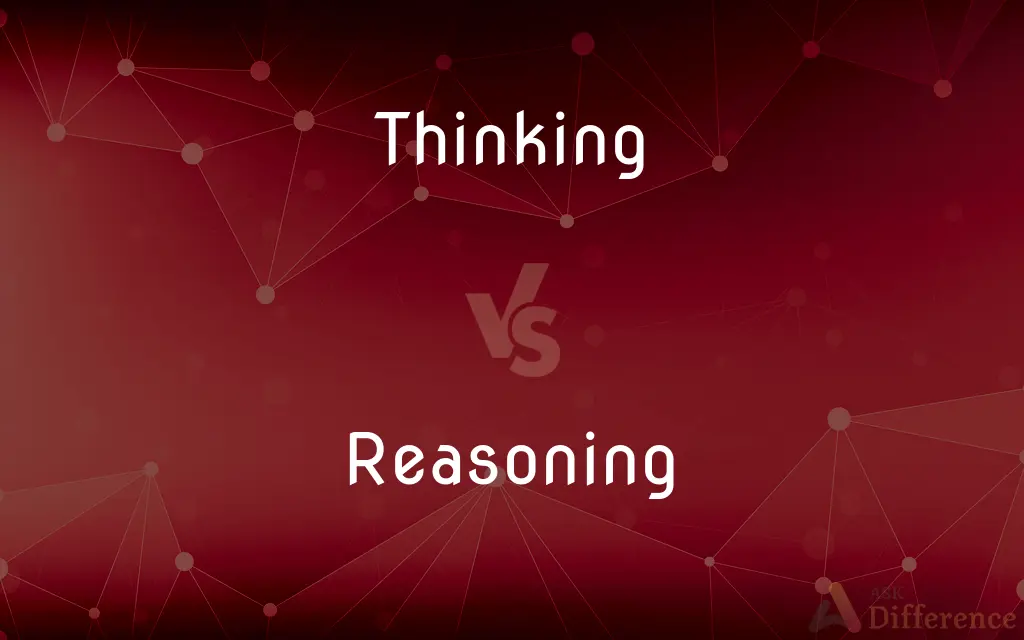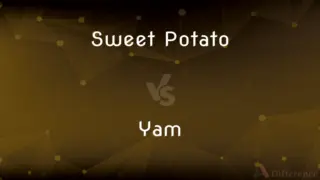Thinking vs. Reasoning — What's the Difference?
Edited by Tayyaba Rehman — By Fiza Rafique — Updated on September 28, 2023
Thinking is the cognitive process of forming ideas, while reasoning is the logical and analytical thinking that leads to conclusions.

Difference Between Thinking and Reasoning
Table of Contents
ADVERTISEMENT
Key Differences
Thinking is a broad cognitive process that encompasses mental activities such as contemplating, pondering, and reflecting. It involves the generation of ideas, concepts, and mental images. Thinking is often subjective and can be influenced by emotions, personal experiences, and creativity. It serves as the foundation for higher-level cognitive functions like problem-solving, decision-making, and critical analysis. Reasoning, on the other hand, is a specific aspect of thinking that emphasizes logical and analytical thought processes. It involves the use of evidence, facts, and principles to draw conclusions or make inferences. Reasoning follows a structured and systematic approach, where premises lead to logical outcomes. It is typically objective and strives to eliminate biases and emotions from the decision-making process.
In summary, thinking is the broader mental activity of generating ideas and mental content, while reasoning is a focused form of thinking that involves logical analysis to draw conclusions.
Comparison Chart
Definition
Broad cognitive process
Specific logical and analytical thinking
Characteristics
Includes contemplation and reflection
Involves structured and systematic thought
Subjectivity
Can be influenced by emotions and creativity
Strives to be objective and unbiased
ADVERTISEMENT
Purpose
Forms ideas, concepts, and mental images
Draws conclusions based on evidence
Applications
Underlies problem-solving, decision-making, and creativity
Essential in mathematics, science, and logic
Compare with Definitions
Thinking
Thinking generates ideas and concepts.
Innovations often start with imaginative thinking.
Reasoning
Reasoning is an essential tool for problem-solving.
Critical reasoning helps resolve complex issues.
Thinking
Thinking can be influenced by personal experiences.
Personal biases can affect one's thinking.
Reasoning
It draws conclusions based on evidence and facts.
Scientific reasoning relies on empirical data.
Thinking
Thinking occurs continuously as the mind processes information.
Thinking helps us make sense of the world.
Reasoning
It involves structured thought processes leading to conclusions.
Reasoning helps us reach informed decisions.
Thinking
Thinking is the cognitive process of forming ideas and mental content.
Deep thinking can lead to creative solutions.
Reasoning
Reasoning is logical and systematic thinking.
Mathematical reasoning follows clear steps.
Thinking
It includes reflection and contemplation on various subjects.
Philosophers engage in profound thinking.
Reasoning
Reasoning strives to be objective and unbiased.
Legal reasoning requires impartiality.
Thinking
The process of considering or reasoning about something
The selectors have some thinking to do before the match
Reasoning
Use of reason, especially to form conclusions, inferences, or judgments.
Thinking
Using thought or rational judgement; intelligent
He seemed a thinking man
Reasoning
Evidence or arguments used in thinking or argumentation.
Thinking
The act or practice of one that thinks; thought.
Reasoning
(uncountable) The deduction of inferences or interpretations from premises, abstract thought, ratiocination; (countable) any instance of this, especially as a process leading to an action, motive.
Thinking
A way of reasoning; judgment
To my thinking, this is not a good idea.
Reasoning
(countable) A Rastafari meeting held for the purposes of chanting, prayer and discussion.
Thinking
Characterized by thought or thoughtfulness; rational
We are thinking animals.
Reasoning
Present participle of reason
Thinking
Thought; gerund of think.
What is your thinking on this subject?
Reasoning
The act or process of adducing a reason or reasons; manner of presenting one's reasons.
Thinking
Present participle of think
I'm thinking about inventing a new perpetual-motion machine.
Reasoning
That which is offered in argument; proofs or reasons when arranged and developed; course of argument.
His reasoning was sufficiently profound.
Thinking
Having the faculty of thought; cogitative; capable of a regular train of ideas; as, man is a thinking being.
Reasoning
Thinking that is coherent and logical
Thinking
The act of thinking; mode of thinking; imagination; cogitation; judgment.
I heard a bird so sing,Whose music, to my thinking, pleased the king.
Reasoning
Endowed with the capacity to reason
Thinking
The process of thinking (especially thinking carefully);
Thinking always made him frown
She paused for thought
Thinking
Endowed with the capacity to reason
Common Curiosities
What is thinking?
Thinking is the cognitive process of generating ideas and mental content.
How does thinking relate to creativity?
Thinking, particularly creative thinking, can lead to innovative ideas and solutions.
Why is reasoning important in science?
Scientific reasoning relies on evidence-based analysis to make accurate conclusions.
Can reasoning eliminate biases?
Reasoning strives to be objective and unbiased, reducing the impact of personal biases.
Can emotions influence thinking?
Yes, emotions can impact thinking by affecting perceptions and decision-making.
How does reasoning differ from thinking?
Reasoning is a structured and systematic subset of thinking that emphasizes logical thought.
Where is reasoning commonly applied?
Reasoning is essential in fields like mathematics, science, philosophy, and problem-solving, where logical deduction is crucial.
What are some real-world applications of thinking?
Thinking underlies problem-solving, decision-making, and creativity in various fields.
Is thinking a conscious process?
Thinking can be both conscious and subconscious, occurring continuously.
What is reasoning?
Reasoning is a specific form of thinking that uses logic and analysis to draw conclusions.
Share Your Discovery

Previous Comparison
Sweet Potato vs. Yam
Next Comparison
Flight vs. AircraftAuthor Spotlight
Written by
Fiza RafiqueFiza Rafique is a skilled content writer at AskDifference.com, where she meticulously refines and enhances written pieces. Drawing from her vast editorial expertise, Fiza ensures clarity, accuracy, and precision in every article. Passionate about language, she continually seeks to elevate the quality of content for readers worldwide.
Edited by
Tayyaba RehmanTayyaba Rehman is a distinguished writer, currently serving as a primary contributor to askdifference.com. As a researcher in semantics and etymology, Tayyaba's passion for the complexity of languages and their distinctions has found a perfect home on the platform. Tayyaba delves into the intricacies of language, distinguishing between commonly confused words and phrases, thereby providing clarity for readers worldwide.














































